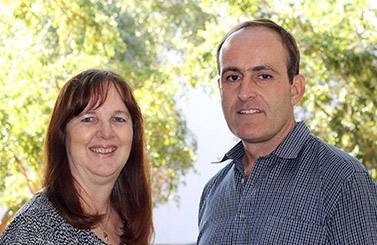
Prof Jeanet Conradie and Dr Karel von Eschwege Photo: Leonie Bolleurs |
Prof Jeanet Conradie, Professor in the Department of Chemistry at the University of the Free State (UFS), has received the Merck Medal for 2014 from the South African Chemistry Institute (SACI), for her paper Redox potentials of ligands and complexes. A DFT approach, S. Afr. J. Chem. 2011, 64, 203-209.
Dr Karel von Eschwege, the co-author of the paper is also from the Department of Chemistry.
The medal is awarded to the senior author of the paper, published in the South African Journal of Chemistry in a specific field of chemistry, that is judged to have made the most significant contribution to the discipline. The award for 2014, covering papers published in the period 2010 to 2013, was in the field of Inorganic Chemistry.
As part of the award, Prof Conradie will deliver the Merck Medal Lecture at the presentation ceremony.
In 2014, Prof Conradie was runner-up in the senior category for Distinguished Women Researchers: Physical and Engineering Science in the Department of Science and Technology’s 2014 Women in Science Awards. The Academy of Science of South Africa (ASSAf) also invited her to become a member.
Prof Conradie believes to reach a goal, you have to utilise opportunities that come your way. “Remember, results speak for themselves. Any researcher can prove himself or herself this way. Nothing in life is for free; you need to work very, very hard. This is only possible when you love and enjoy your work,” she said.